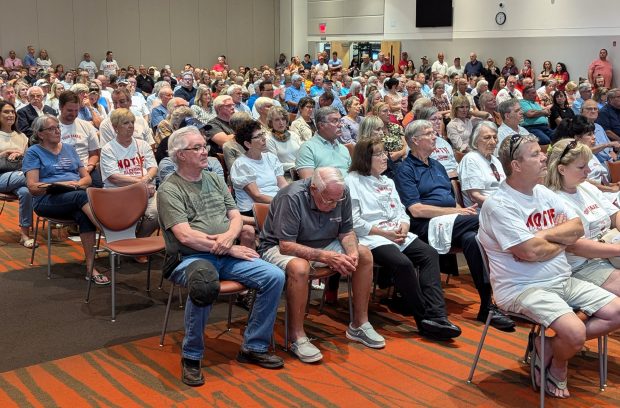After scrapping a heavily-opposed development proposal in 2019, Crown Community Development formally submitted a new project last month to the village of Sugar Grove, and once again, opposition is mounting.
Crown Community Development is a national land development company based in Naperville and, according to its website, one of the largest privately held businesses in the United States. The company owns roughly 760 acres of land around the Interstate 88 and Route 47 interchange in a currently unincorporated area near Sugar Grove.
That land has been the subject of a number of development proposals over the years. The latest, known as The Grove, would be a mixed-use development with significant stretches of residential, commercial and industrial uses as well as a town center and over 200 acres of open space, according to project documents submitted to the village of Sugar Grove.
Crown Community Development is asking for the 760 acres to be annexed into the village, subdivided based on its plans and zoned under a special project’s category rather than an existing village category, project documents show.
Village officials have said the development would benefit the village by bringing needed housing stock of various types, new businesses and more open space to the village while also diversifying its tax base.
But there would also be significant costs to the village and its residents if the project were approved, since there would be more infrastructure to maintain, more permits to be given, more land to code enforce, more roads for police to patrol and more traffic, Sugar Grove Village Administrator Scott Koeppel said in a recent interview with The Beacon-News.
The hope, he said, is that the benefits outweigh the costs.
The village is set to consider the project at a number of upcoming meetings, where Crown Community Development is likely to meet significant pushback from many residents of Sugar Grove and neighboring areas, particularly Blackberry Township.
Those opposed to the project say it would hurt nearby homeowners — particularly those in unincorporated Blackberry Township that do not have a voice in the Sugar Grove government — by potentially disrupting the water supply, increasing traffic and disturbing the area’s rural character, among other concerns.
Those concerns are likely to be voiced at the first village meeting formally considering the project – a Sugar Grove Plan Commission and Zoning Board of Appeals public hearing scheduled for 5 p.m. Monday at Village Bible Church, 847 N. Sugar Grove Parkway in Sugar Grove.
An official meeting timeline posted to its website shows the village is prepared to extend the meeting for an additional three days, all at the same time and place, if needed.
The village is also planning to hold a Village Board public hearing on the proposed project, where the board will formally discuss the proposal for the first time, at 6 p.m. Aug. 20 at Waubonsee Community College’s Academic and Professional Center at 4S783 Route 47 in Sugar Grove.
The Village Board would not take a vote at that meeting, according to the meeting timeline. A final vote on the proposed project could potentially be held at the following Village Board meeting at 6 p.m. Sept. 3 at the same location as the Village Board public hearing.
Project details
Conceptual plans for the project, which were included in the project’s applications to Sugar Grove, show roughly 400 acres of the property dedicated to residential development.
That residential area, primarily planned to be neighborhoods, is set to be located south of I-88. This part of the 760-acre site, which would also have roughly 45 acres of mixed-use development and would include a town center, is the closest to the existing Sugar Grove boundary line.
The proposed town center would include a village green, mixed-use development and a new village hall. A village park is also planned for the area and would include pickleball courts, “playscapes,” a splash pad, food truck areas, a beer garden and a farmers market, plans show.
In total, the project could potentially have up to 1,500 residential units in a combination of single-family houses, townhomes, duplexes and multi-family homes, according to a website dedicated to the proposal.
A 244-acre business park is planned for north of I-88, plans show. That area, proposed to be called Grove Park, could support a number of land uses, including health care, business suites, retail, restaurants, multi-family housing, distribution, data centers and other services, a news release about the project previously said.
The area north of I-88 would also include roughly 78 acres of mixed-use development, which would allow for commercial, retail, office or residential construction, plans show.
If the project is approved and the area gets fully developed, The Grove could bring in roughly 4,600 permanent jobs, according to past reporting.
However, Crown Community Development is a land developer, not a building company, according to Jennifer Cowan, Crown’s director of Community Development.
She said in a recent interview that Crown would do the work of annexing the land into the village, getting the land zoned, subdividing the land and making it ready for further development by putting in needed infrastructure and making other site improvements. Then, Crown would sell the land to other developers who would actually build the structures.
But Crown would be fully developing the proposed parks and the structures within them, Cowan said.
Within all of the land uses, the proposed development is planned to include 200 acres of open green space that would include parks, five miles of interconnected trails and naturalized areas that preserve 70 acres of mature tree groves in the area, the company previously said in a news release.
The village of Sugar Grove has proposed a 23-year tax increment financing, or TIF, district to support the development. Without the TIF district, Cowan said the project would not be profitable.
State law allows local governments to create TIF districts to encourage the development of areas where development would otherwise not be financially viable.
When growth takes place in a TIF district, the extra taxes that come from that growth are placed into a special fund instead of being distributed among all taxing bodies during the district’s duration. The money in that special fund can then be used by a local government to pay costs associated with the development within the TIF district, such as creating or improving public infrastructure.
While some communities sell bonds to improve a TIF district, banking on the funds generated within the TIF to pay off those bonds, Sugar Grove is taking a different approach.
Crown Community Development will be funding its own infrastructure construction at the site, and if the land does develop because of that construction, then funds generated by the TIF will go to pay Crown back for eligible infrastructure and site work, village officials have previously said.
However, if enough taxes are not generated to pay Crown back for the work, the village will not be on the hook for the rest of the money, making it a better deal than a bond issue, officials have said.
Since Crown would use its own funds to build the infrastructure, the company would effectively be financing publicly-owned utilities and infrastructure, Cowan said.
Crown Community Development would not develop the land without a TIF district because, based on the high cost of infrastructure, the revenue generated by selling the finished land would not be enough to offset the development cost, according to Cowan.
For example, she said just the water infrastructure alone will cost the company roughly $22 million to install.
Opposition to The Grove
“I think that if the project were exactly as it’s marketed — where it’s a beautiful town center, it has all these amenities, there’s residential housing — if it was encapsulated to just that, I think everybody would be pretty accepting of it,” Carolyn Anderson, one of the main voices in opposition to The Grove, said in a recent interview.
The problem most have with the proposed development, she said, is the 244-acre industrial park.
While the primarily residential portion of the project is facing Sugar Grove, where the village already has neighborhoods, the primarily industrial portion is proposed for the other side of I-88, further away from the village boundary.
But that doesn’t mean the nearby land is totally empty. Mixed-use areas that would allow for retail, office, civic or residential development are planned to be across the street from a single-family neighborhood in Blackberry Township, according to proposed site plans submitted to Sugar Grove.
Just beyond those mixed-use areas would be the proposed 244-acre industrial park, the proposed site plans show.
Residents of that Blackberry Township neighborhood, such as Anderson, say that Crown Community Development and the village of Sugar Grove are not listening to their concerns. Since they are not Sugar Grove residents, they have no way to make their voice heard in village elections, either.
One of the neighborhood’s primary concerns is the water supply, according to Anderson.
She said the homes rely on shallow water wells, not a water utility, and the aquifer providing water to those wells could be disrupted by the proposed project, either through site work or from new wells put in to support the development.
Another nearby Blackberry Township resident and outspoken critic of the project, Dale Essling, said in a recent interview that he was concerned about the amount of trucks that would be on the roads, along with the other traffic generated by the development, if the project were to be approved.
The industrial park area would allow the construction of warehouses, and many residents of Sugar Grove and neighboring communities have loudly opposed warehouse development in the area.
Industrial uses within the development would be capped at a maximum of three-and-a-half-million square feet, according to Crown Community Development’s Cowan. She said sorting facilities are further capped at one-and-a-half million square feet.
Essling said his concern was that not all trucks leaving the proposed industrial park would take I-88, which has a toll. As a former truck driver, he said it would make more financial sense for drivers to take other roads until reaching an interstate without a toll.
The development would also change the area’s rural character, Essling said. While the project’s application says the project is “appropriate at a full access interchange along a desirable corridor,” Essling said no one has come to actually study the area’s character and consider the impact of the proposed development.
Anderson said she is concerned about language in the proposed annexation agreement that would seemingly force Sugar Grove to be a partner with Crown Community Development in lawsuits made against the project.
Anderson and Essling are also opposed to the TIF district proposed to support the project. They are seemingly not alone in this sentiment, as concerned residents packed a public hearing on the TIF district held in June.
Blackberry Township itself is also opposed to the TIF district, and so is the Blackberry Township Road District, according to letters written by administrators of the government bodies.
Both letters say that the TIF district would negatively impact their abilities to serve their residents by increasing needed services without contributing additional tax dollars.
The two administrators, Blackberry Township Supervisor Esther Steel and Road Commissioner Rodney Feece, said in the letters that they do not believe the land even qualifies for a TIF district under state law.
Residents opposed to the TIF district have similar concerns.
Essling said that, while the TIF district would not have a direct impact on residents’ taxes, the government bodies missing out on tax dollars would still need to provide services to the development, which could lead to tax increases.
Sugar Grove’s Koeppel said the development could also generate sales, utility and other taxes that would not be subject to the TIF district, which would hopefully offset the costs of the development.
Other residents, speaking at the TIF district public hearing on June 18, said they also did not believe the land qualifies for a TIF district under state law because the land has been farmed recently and because they disagreed with a survey that found water runoff from the land contributes to downstream flooding.
Residents at the meeting also questioned why the public should subsidize the project just so Crown Community Development can make a return on their investment in the land.
Both Anderson and Essling said they know development is inevitable for the area, but that they would prefer residential development, light commercial development and health care rather than industrial uses.
Crown Community Development and the village of Sugar Grove want and value community input, both Cowan and Koeppel said.
According to Koeppel, the village wants people to look through the documents submitted by Crown and to bring any issues to the village’s attention.
“We’re not perfect, we’re people, so we encourage the feedback,” Koeppel said.
Crown Community Development has been listening to community feedback and has held community meetings to listen to residents, according to Cowan. She said plans for The Grove were changed to incorporate some of the feedback heard at those meetings.
Not everyone in the village is opposed to the development, and Cowan said Crown is listening to all voices – those in favor and those opposed.
Cowan said she doesn’t know what the Plan Commission and Zoning Board of Appeals will decide about the project, but she does not expect it will be automatically accepted. Although she said Crown has put forward a good plan, the board may want to make changes to the plan, and she said those changes may or may not work for Crown.
rsmith@chicagotribune.com





